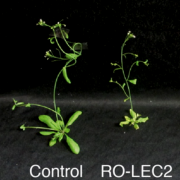bioRxiv: Stable epimutations after regeneration
Predictable and stable epimutations induced during clonal propagation with embryonic transcription factors
Wibowo et al. (2022) bioRxiv 2022.03.15.484412
Read the Twitter thread here
Although clonal propagation is frequently used in commercial plant breeding and plant biotechnology programs because it minimizes genetic variation, it is not uncommon to observe clonal plants with stable phenotypic changes, a phenomenon known as somaclonal variation. Several studies have shown that epigenetic modifications induced during regeneration are associated with this newly acquired phenotypic variation. However, the factors that determine the extent of somaclonal variation and the molecular changes associated with it remain poorly understood. To address this gap in our knowledge, we compared clonally propagated Arabidopsis thaliana plants derived from somatic embryogenesis using two different embryonic transcription factors- RWP-RK DOMAIN-CONTAINING 4 (RKD4) or LEAFY COTYLEDON2 (LEC2) and from two epigenetically distinct tissues. We found that both the epi(genetic) status of explant and the regeneration protocol employed play critical roles in shaping the molecular and phenotypic state of clonal plants. Phenotypic variation of regenerated plants can be largely explained by the inheritance of tissue-specific DNA methylation imprints, which are associated with specific transcriptional and metabolic changes in sexual progeny of clonal plants. Moreover, regenerants from roots were particularly affected by the inheritance of epigenetic imprints, which resulted in increased accumulation of salicylic acid in leaves and accelerated plant senescence. Collectively, our data reveal pathways for targeted manipulation of phenotypic variation in clonal plants.




